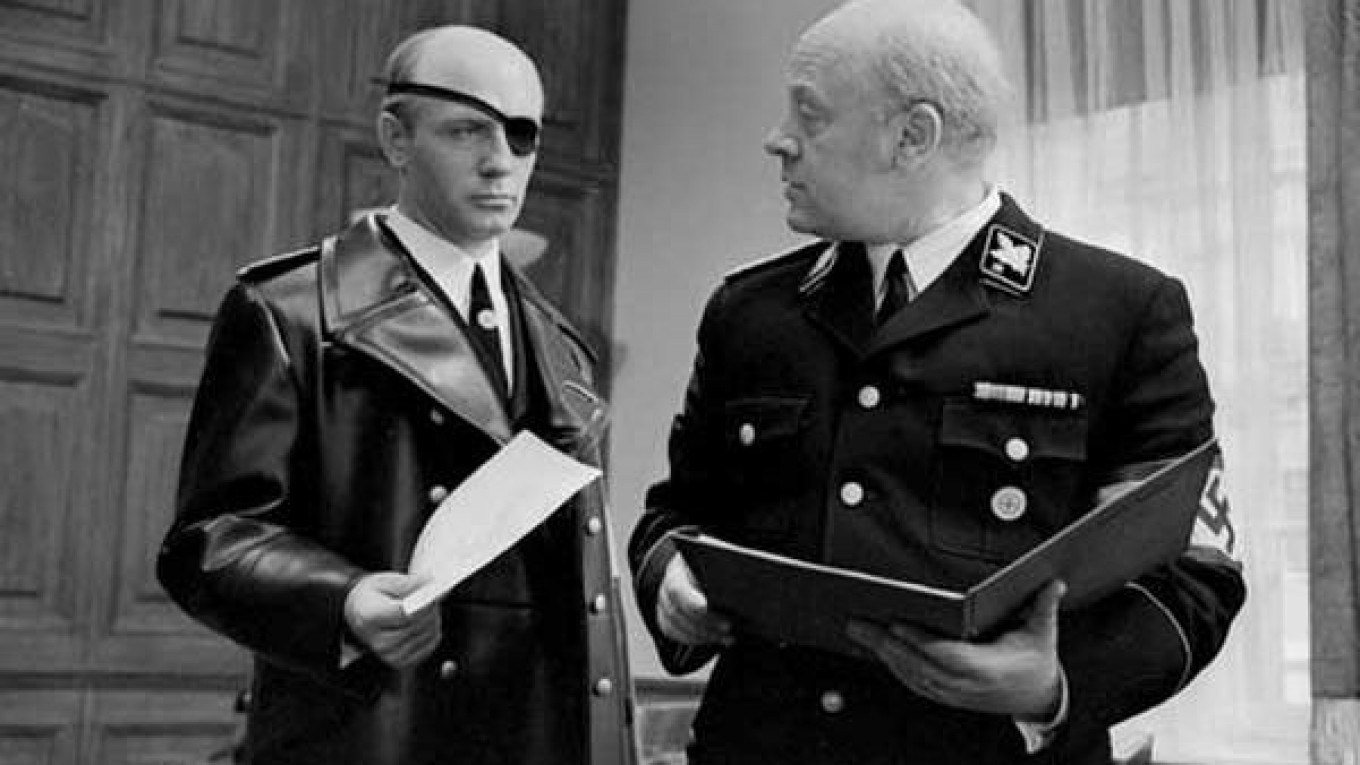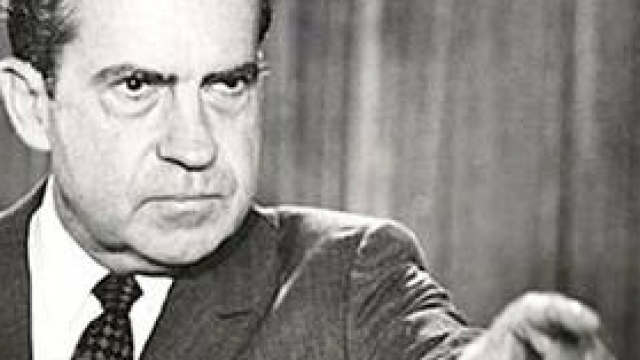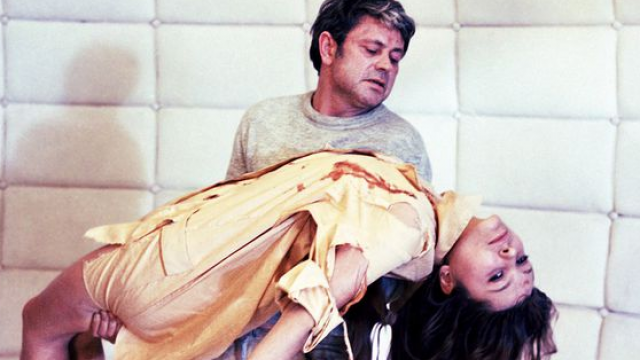It’s Danger Runs Amok Week on Moscow TV, as spies, fifth columnists and unrepentant Nazis parade menacingly across viewers’ small screens. Fortunately, the parade is entertaining, instructive and interrupted by a spirited intellectual boxing match for the title of the country’s Musical Capital. Here’s the where and when:
Nostalgic for some old-fashioned non-cyber espionage? The Doverie channel has just the thing: Tatiana Lioznova’s taut and telling serial “Seventeen Moments of Spring” (1973). Easily the best spy thriller produced by Soviet television, "Seventeen" recounts the adventures of Soviet secret agent "Max Otto von Stirlitz" (the stoic Vyacheslav Tikhonov), a mole fighting the good Soviet fight deep inside the Third Reich’s fearsome SS in the waning weeks of World War II. During its original airing, the 12-part feature quickly vaulted from TV serial to national event, and the film’s mesmerizing power over Soviet audiences, derived from suspenseful storytelling, viewer identification and (apparent) authenticity, has long since made it a hardy perennial on the Russian small screen. “Seventeen” holds up well today — not least for the added fillip that its suspenseful derring-do and top-secret intelligence ops implicitly mock a regime that designates pop singers, soldiers' mothers and bird sanctuaries "foreign agents."
Seventeen Moments of Spring Семнадцать мгновений весны. Doverie, Monday at 11:20 a.m. and 11:45 p.m. (Tuesday-Friday times vary slightly)
Moscow is the capital of Russia, of course — yet St. Petersburg is often called the “northern Capital” and the “cultural capital” of the country. Well then, which one should be called the “musical capital”? Host Sati Spivakova brings together musical heavyweights from the two contending cities to duke it out over the rights to this title on Tuesday’s edition of the TEFI award-winning series “Sati: Engaging the Musical Classics” (2016). Representing the Venice of the North, we have the esteemed Leonid Gakkel, well-known music critic, historian, professor at the historic St. Petersburg Conservatory and author of “The 1990s: The End of the Century Through the Eyes of a St. Petersburg Musician” (SPb, 1999). And in the Big Onion’s corner is one of Sati’s most articulate regulars, Muscovite Dina Kirnarskaya – Vice-Rector and professor at Moscow’s prestigious Russian Gnesins’ Academy of Music and author of “The Natural Musician: On Abilities, Giftedness and Talent” (Oxford, 2009).
Full disclosure: my money’s on Kirnarskaya — but then I translated “The Natural Musician,” so I know her best moves. More seriously, this episode shapes up as one of Sati’s most entertaining, a memorable encounter between real and really accessible music experts from which all music-loving viewers will come out winners.
“Sati: Engaging the Musical Classics…” with Dina Kirnarskaya and Leonid Gakkel. "Сати. Нескучная классика..." с Диной Кирнарской и Леонидом Гаккелем. Kultura, Tuesday at 4:30 p.m.
In 1966 Andrei Sinyavsky and Yuli Daniel were arrested, tried and sentenced to prison for writing what they felt like writing and getting it published the only place they could – outside their Soviet homeland. Two years later a small but courageous handful of Soviet citizens went out onto Red Square to demonstrate against their country’s invasion of Czechoslovakia – a protest that lasted a matter of minutes but, like the Sinyavsky-Daniel trial, produced enormous consequences. The two cases became watershed events in Russian history, key moments in the struggle of citizens of the USSR to exercise the rights and freedoms that Soviet law guaranteed but the Soviet state in fact denied. What happened to these brave souls and others like them is ably chronicled in the Evgeny Mezentsev documentary “Dissidents: The Fifth Column” (2013). As the alleged “fifth columnists” of today draw media fire and prison terms under the current hybrid-authoritarian post-Soviet regime, the Top Secret channel deserves major credit for reminding Moscow viewers just what arbitrary law enforcement and bogus prosecutions eventually lead to.
Documentary Investigation. “Dissidents: The Fifth Column” Документальное расследование. “Диссиденты. Пятая колонна”. Top Secret, Wednesday and Thursday at 6:10 a.m.
If there was a principal villain in the Soviet state’s campaign against dissidence in the 1960s and 70s, it was Yury Andropov, chairman of the KGB for a period of 15 years beginning in 1967. But how villainous was the villain, and what other dimensions did he show once he finally departed the organs of state security for the higher calling of General Secretary of the Communist Party? Natalia Metlina’s documentary “Andropov: The Man from the KGB” (2014) focuses on both the actual and the hypothetical, asking, “Was Andropov really a suppressor of freedom, as the dissidents saw him, or was he a would-be reformer, a proponent of genuine economic reorganization that he could not to bring to life?” Or perhaps both? Tune in for a look at the long and very checkered career of one of the most complex figures in Soviet history – and one of the most interesting to speculate about in alternative versions of it.
Andropov: The Man from the KGB Андропов. Человек из КГБ. 365 Days TV, Thursday at 7:05 a.m. and Friday at 2:35 a.m.
People around the world are asking – and with a new sense of urgency after the U.S. presidential election — just how the mechanics of populist demagoguery function once the Leader has conned and maneuvered his way to power. Russians can offer one example to ponder, while Americans are preparing another – and both groups may find the recent British documentary “Hitler’s People” (2015) instructive. This two-part feature explores how Adolf Hitler, once entrenched in the Reich Chancellery, was able first to “reconstruct the country to center around himself” and then, as the Reich was failing, to “rely on the support of the German public even in the face of unspeakable suffering and impending doom.”
Written and directed by Peter Hartl and Alexander Berkel, the feature’s two segments (“Conformity” and “Total War”) explore “the reasons behind Hitler's power at the beginning and towards the end of his regime,” an examination of the dictatorship “from the inside, through individual lives, documents, diaries, [and] photographs.” Was the almost incredible loyalty of the German masses really an anomaly, a counterintuitive reaction that should surprise us today? If not, why not — and what does it tell the admirably and hopefully “disloyal” among us today?
Hitler’s People Люди Гитлера. Viasat History, Friday at 1:50 a.m. (Part 1) and Saturday at 1:55 a.m. (Part 2)
Mark H. Teeter is the editor of Moscow TV Tonite on Facebook
A Message from The Moscow Times:
Dear readers,
We are facing unprecedented challenges. Russia's Prosecutor General's Office has designated The Moscow Times as an "undesirable" organization, criminalizing our work and putting our staff at risk of prosecution. This follows our earlier unjust labeling as a "foreign agent."
These actions are direct attempts to silence independent journalism in Russia. The authorities claim our work "discredits the decisions of the Russian leadership." We see things differently: we strive to provide accurate, unbiased reporting on Russia.
We, the journalists of The Moscow Times, refuse to be silenced. But to continue our work, we need your help.
Your support, no matter how small, makes a world of difference. If you can, please support us monthly starting from just $2. It's quick to set up, and every contribution makes a significant impact.
By supporting The Moscow Times, you're defending open, independent journalism in the face of repression. Thank you for standing with us.
Remind me later.







